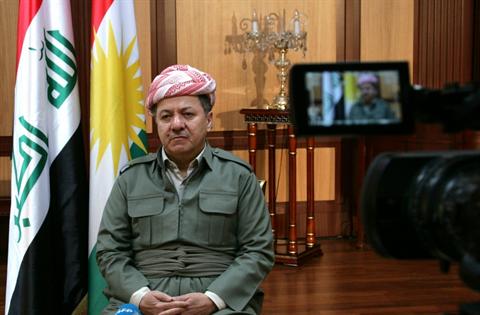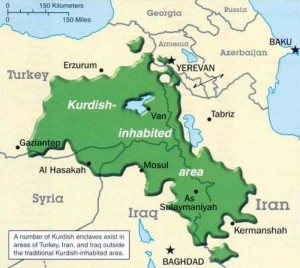
October 18-2013
The president of Iraqi Kurdistan, Masud Barzani, says Kurds throughout the Middle East have a right to their own country, but insisted this would not be achieved through violence.
Kurds form the majority in contiguous parts of Iran, Iraq, Turkey and Syria and have often struggled for independence from those countries. But in recent years, such talk has generally been suppressed—especially among the Iraqi Kurds who have achieved local autonomy with their own elected government headed by Barzani.
Therefore, it was a surprise when Barzani himself raised the issue of independence in an interview with Agence France Presse (AFP).

It is “a natural right for there to be a state for the Kurdish people, but this will not be achieved by violence, and must be done in a natural way,” Barzani said.
This “age is the age of understanding, and we encourage dialogue between the Kurds and … the states” where Kurdish populations live, he said.
He did not explain how statehood could be achieved when Iran and Turkey have both forcefully put down independence/autonomy movements and Iraqi Kurds only won autonomy when the Iraqi central government was weakened by Kurdish rebellions and foreign wars.
In Iraq, the Kurds now have a three-province autonomous region in the country’s north with its own government, security forces, flag and borders.
Although Iraqi Kurdistan and the federal government in Baghdad moved to reduce tensions earlier this year, they are still at odds over a number of issues.
The latest uprising of Kurds is in Syria where the minority was largely quiet until the rebellion arose against President Bashar al-Assad two years ago. Now the Syrian Kurds have risen and carved out an autonomous area in the eastern tip of Syria. Their movement is facing a serious challenge not from Assad, but from Sunni rebel groups who want to open a direct highway link to Sunni areas of Iraq.
Barzani hinted that he was contemplating intervening in Syria on behalf of the Syrian Kurds.
“We will not hesitate in directing strikes [against] the terrorist criminals in any place,” Barzani told the AFP when asked about the possibility of Kurdish action against militants in Iraq or Syria. “Our duty is to protect the Kurds if we are able,” he said.
Barzani made a distinction between that and being drawn into Syria’s civil war, which he said the Kurds must try to avoid.
“Our opinion is that the Kurds must stand at the same distance” from all parties in the conflict, so “the Kurdish people are not forced into a war” from which they will gain nothing, Barzani said.
But Syrian Kurdish forces have already been drawn into the fighting, clashing with jihadist groups who want to secure a land corridor connecting them to Iraq.
The violence has pushed tens of thousands of Syrian Kurds across the border, seeking refuge in Iraqi Kurdistan.
Barzani said Iraqi Kurdistan has provided military training to Syrian Kurds so they could defend their communities — the first public acknowledgement that this has been done.
“A number of young [men] were trained, but truly not with the aim of entering the war,” Barzani said.
In Iran, the Fars news agency picked up the AFP interview and ran what Barzani had to say about Syria—but it cut out everything Barzani said about Kurdish statehood.
